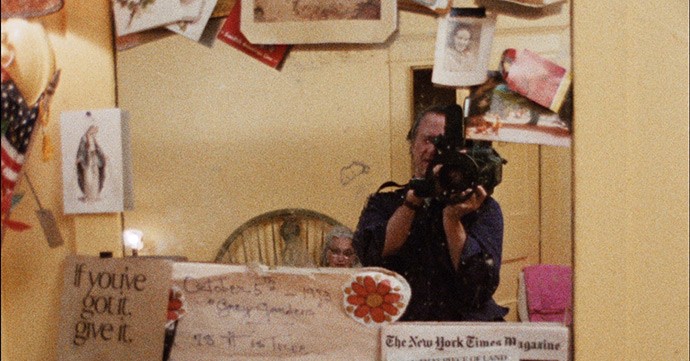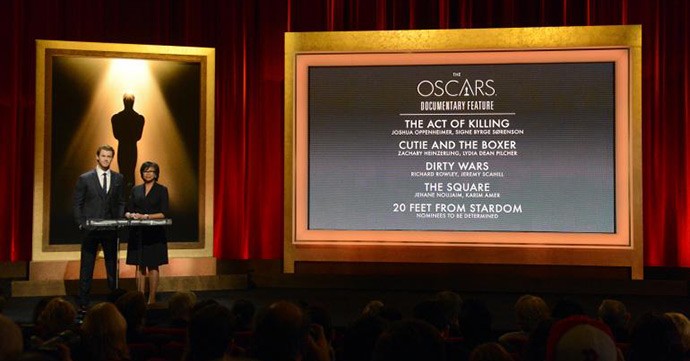
Cinema of the Performatively Sublime, Direct from the Source
Variable modes of watchful documentary cinema have been called many things over the years – actuality dramas by Allan King, observational cinema by Frederick Wiseman, cinéma vérité by Jean Rouch, and finally direct cinema by Robert Drew and his young, ambitious associates Richard Leacock, D.A. Pennebaker, Terence Macartney-Filgate, and Albert and David Maysles. Steadfast until his recent death at 88, Albert Maysles employed his firm belief in the direct cinema ethos, that documentary film should be encapsulations of reality, without interference by voiceover or reenactment, though never attempting to fool the audience into forgetting the prescience of the filmmakers themselves. It’s a matter of capturing the emotional truths in any given situation, whether they be when salesmen candidly speak to camera about their methods of bible peddling in the doc classic SALESMAN or documenting the making of Wes Anderson’s film “The Life Aquatic With Steve Zissou” in “This Is An Adventure”.
In a recent interview with Joshua Oppenheimer conducted at the Based on a True Story conference at the University of Missouri’s journalism school, the filmmaker behind the oddly performative, seering Indonesian expose THE ACT OF KILLING stated, “In so-called ‘fly-on-the-wall’ documentary, there’s a claim that the camera is a transparent window onto a pre-existing reality. But what really is happening is that the director and the film crew and the subjects are collaborating to simulate a reality in which they pretend the camera is not present. It’s a kind of dishonest story about how the film was made that performs a useful function — namely it helps us to suspend our disbelief and perceive that simulation as reality…No one forgets the presence of the camera, no matter how long it’s there. All documentaries are performance. They are performance precisely where people are playing themselves.”
No better statement could surmise what takes place in the films of Albert Maysles. Unobtrusive in their watch and wait technique, but always operating in their sweet-spot when the camera becomes a sounding board for his chatty, often eccentric subjects, Maysles’ films thrive on unrequited conversational performance and ethical murkiness. Just a week before Albert died at the age of 88 on March 5th, the same day that his masterpiece GREY GARDENS was to be re-released in theaters, Richard Brody wrote a piece in The New Yorker titled “All Documentaries Are Participatory Documentaries” in which he most acutely writes, “The subject of the film is performance, and the filmmakers are no mere observers of the action, they’re its catalysts. Filtering themselves out of the dialogue and off the screen (an editorial trick that might be fun to try at home) would do worse than to thin out the film—it would falsify it.”
When we’re first introduced to Big and Little Edie, the aunt and cousin of Jacqueline Kennedy Onassis, in a flurry of conversational chaos – “I’m gonna get naked in just a minute, so you better watch out.” – “That’s what I’m afraid of.” – “Now why? I haven’t got any warts on me.” – “But the movie….the movie!” – in the sun and shade of their dilapidated, though beloved, old money mansion off the shores of the Atlantic – “any place on Earth would be much worse” – we don’t know what to think. Is there something wrong with these people? Why are they dressed as they are (or aren’t)? Why are they continuously bickering? Are they always this eccentric? In their lovably ragged on screen appearances, are they being exploited for our entertainment? These are all valid questions, yet the filmmakers employed footage with intention, just as the Beales of Grey Gardens portrayed themselves.
As the camera rolls on, with Al Maysles behind the viewfinder, panning and zooming in on revealing facial expressions and hand gestures that hint at the underlying emotional gravity of the given situation, we begin to see that, although there are heartbreaking truths about ageing and the peculiar nature of family relations, their somewhat bizarre on screen personas are an amplified version of themselves. Their performances see them laying claim to strong wills and lives lost in the pursuit of failed artistic endeavors. The film is no less a document of the wacky happenings on screen as a self proclaimed public record of the Beales as a respectable family of wealth, moral fiber and artistic integrity. And the Maysles were smart enough to grasp onto that performed reality and integrate it into the very DNA of their cinema.
______
GREY GARDENS is Influence Film Club’s featured film for April. Each month Influence Film Club hand-picks one of our favorite docs as our club’s featured film to watch and discuss together. Throughout the month, starting with our newsletter and continuing on our website and social media we will extend the conversation by exploring the various issues touched on in the film, providing filmmaker interviews, suggesting ways to Influence, and discussing documentaries in general – because after all, We Love Docs.
Written by: Jordan M. Smith

100 is not just a number. 100 stands for crossing a line. 100 is a mark. And while for some people it means they have to throw the biggest birthday party of their life, for us it is an inspiration. Keeping this numeric symbol in sight, we’ve happily spent the past year in handpicking our favorite documentaries and creating dedicated film pages around them. We had late nights and lots of coffee, took challenges and feedback, chased our dream through highs and lows in order to bring something innovative and good to you. And here we are on this day in February, humbled and proud, presenting the first 100 documentaries that motivated us throughout the past year and that motivate us to bring you 100 more, because oh, there are so, so many more. We hope they spark your lives as much as they have sparked ours. We hope they bring us together. We hope we will influence you. Because remember, a good documentary is just the beginning…
So our first 100 films (in alphabetical order because we love them all) are:
In a world of sound-bites, documentaries provide an opportunity to think, understand, share, and connect with the world. These 100 films are controversial, divisive, fascinating, unexpected, and surprising. They are thrillers, dramas, comedies, romance, tear-jearkers, and horror films. Documentaries provide the perfect topic for meaningful conversations.
If you want to talk about the things that matter with people that matter then pick a film, invite your friends, and watch & discuss together. It’s as easy as that. Not sure what film to pick? Each month Influence Film Club is going to hand pick one of our favorite docs as our club’s featured film. And if you just can’t get enough with 1 a month, there are 99 more waiting to be discovered! Its time to watch + engage with some of the world’s best documentaries!

‘Vision is the art of seeing what is invisible to others.’ Jonathon Swift
Prior to the advent of smart phones and digital cameras most people produced little more in the way of pictures than snapshots of family and friends. When it came to homemade films, it was usually jumpy, soundless footage from a super-8 camera that, like still photos, faded over time in a box of memories. The more serious work of creating images was usually in the realm of the professional or the keen hobbyist.
Today everyone is armed with the means to document their own lives, as well as the lives of others. As a result it sometimes seems that with so much visual noise special moments are only lived through the lens of a camera. As we generate this massive influx of content across the digital world the questions are this: are we trying to curate the vision others have of us? Are we attempting to control the narrative of how both ourselves and others are perceived? We’ve been told that a picture is worth a thousand words – if this is true, how many millions of words are being carelessly spilled onto the World Wide Web each day? Is the narrative we are creating sending the message we want others to hear? And which stories are actually worth hearing?
Influence Film Foundation grantee POINT AND SHOOT toys with the question of sharing, how that sharing effects who we are, and where one can find value in this visual world we live in. On the surface the film is about a boy “becoming a man” (as the central character Matthew VanDyke would put it), yet on another level it addresses not only how we see the world but also how we see and present ourselves. Are we the fun party girl posting endless selfies documenting our good times? Are we the deeply artistic boy concerned with images that reveal shape and space? Or are we a passionate foodie taking pictures of each and every delightful meal we prepare or devour?
In POINT AND SHOOT VanDyke uses the camera to reveal what he discovers about himself and the world around him. Many might ask how that is different from what each one of us does on a daily basis as we stare into our phones or other devices trying to capture yet another perfect image.
It’s a question we should all consider as we endlessly take photos and videos of our busy lives: what is the purpose when we ‘point and shoot’? What do we want to say? And do we want to take away more than just a carefully crafted image of ourselves or those we care about that will end up yet another lost posting on a meaningless timeline? Or, would we rather take time and thought to pursue the unexpected or unusual, and in the process create something more lasting both for ourselves and for future generations. Do we want to create and document real value, something that actually matters?
Next time you grab your phone to take a random picture or video, think about what you want to say and what sort of legacy you’re creating. It doesn’t have to be a huge message but maybe it can be more than yet another throw-away snapshot illustrating the endless stream of life.
Essentially, consider your influence. It’s more important than you think.
Don’t miss POINT AND SHOOT’s Official Website, Facebook, and Twitter.
In addition to POINT AND SHOOT Influence Film Forum features a number of films that focus on the visual: VIVIAN MAIER secretly captured slices of her world in an unusual and unexpected way, while BILL CUNNINGHAM has been revealing his unique vision of fashionable New York for decades. The citizen journalists BURMA VJ show the power of the image in effecting change when faced with seemingly insurmountable odds, while AI WEIWEI: NEVER SORRY highlights one of the most engaged and influential artists of our time and the importance of his images being available online and in social media.
We invite you to take the time to check out the films above, as well as the loads of extra material we’ve gathered. Learn more, have fun, and share your experiences.
Real Stories, Real People – it’s what documentary is all about.
Written by: Judi Lembke

“Miss Representing” Women in Media and Politics
‘You can’t be what you can’t see.’ – Marie Wilson, The White House Project
In 1848 the Seneca Falls Convention broke new ground by being the first Women’s Rights convention ever held in the United States. In 1963 the United States Congress passed the Equal Pay Act. In 1964 The United States Congress banned sexual discrimination in the work place. Despite these advancements and many more, in 2014 gender equality remains a battleground.
The portrayal of women in the media plays a significant role in the struggle for gender equality, and MISS REPRESENTATION, a 2014 documentary addressing this issue, does not paint a pretty picture in terms of how far we have come. The way in which women are portrayed in the media has a direct impact on how women are perceived not just by men but by other women as well. The portrayal of women is overwhelmingly one-dimensional: sexualised and often infantilised, if a woman isn’t presented as youthful, beautiful, and infinitely desirable chances are she’s not being seen at all. And if a woman isn’t busy turning on the male viewer then she really has no positive value as far as the media is concerned.
This, in turn, impacts women’s ability to achieve their goals. If half the population is continually reduced to being little more than a sexual plaything then their ability to be seen – and to see themselves – as anything outside of that narrow spectrum is severely compromised. The result is that women struggle to be accepted as intelligent, competent individuals. Girls and younger women have it even worse: because they’re continually bombarded with the message that their worth is based almost exclusively on their youth, beauty and sexual attractiveness they tend to internalise that message, putting inordinate amounts of time and energy into living up to a severely limiting image to the detriment of setting and achieving real, long-term goals that have real value and substance.
While MISS REPRESENTATION focuses on TV, film, and advertising this highly sexualised portrayal of women is not limited to those spaces. And often it’s women who play a key role in perpetuating these expectations, even while declaring themselves empowered.
During Beyoncé’s recent On the Run tour with her husband Jay-Z, she gyrated in front of a huge sign flashing the word ‘feminism’. The media response was all over the map, with singer Annie Lennox calling it ‘tokenism’ and ‘feminism light’, while others gave Beyoncé props for being a powerful woman in a tough industry that is run by men. Others called her out for ‘performing for the male gaze’ and for stamping her husband’s surname on a creation that was all her own, positing that once again here was a woman pandering to the male expectations. Read one of the many reactions here.
Beyoncé isn’t by any means the first or the only modern woman to use her sexuality as part of her arsenal in the rise to power and success; anyone with access to the Internet or any other media could easily list dozens upon dozens of women who have taken the same route.
This leads to some interesting questions: does Beyoncé, or any other woman, not have the right to portray herself in any way she chooses? It would be difficult to argue that she isn’t in control of her sexuality or her choice to represent herself in a sexual manner. Why she makes these choices – and whether those choices are right or wrong – is up for debate, mainly because while many women prefer to be seen not as just a sexual plaything, there is no denying that we are all sexual beings. We want to be desired and fulfilled and that means different things to different people, with no one person or entity having the right to dictate how that should be done or what it means.
The main problem with portraying women solely as sexual beings is that any other point of value is ignored. With the media overwhelmingly controlled by men, women simply aren’t getting a fair shake; if a woman is driven, ambitious, smart, and successful she is often ripped to shreds and presented as a bitch, a harpy, or maybe just someone on her period. It is either implied or outright stated that a woman who isn’t first and foremost desirable to the male gaze is somehow unfeminine and of little value. Despite this – or maybe because of it – a woman’s sexuality is often used to ‘keep her in her place.
Emma Watson, undoubtedly the smartest witch or warlock in the Harry Potter films, recently spoke before the United Nations to launch the He for She campaign. She invited both men and women to come together and join her in the fight for equality, arguing that gender equality is necessary for everyone, male or female, and that both sexes benefit from a society that greets everyone on an equal basis.
Some women called her speech a simplistic, with all too obvious message. Some men said her speech was bad for men. Others hailed her for helping to reach a younger demographic, one that is continually bombarded with hyper-sexualised images of women. Read one reaction here. And yet another reaction was an anonymous group or individual threatening to released allegedly nude photos of her as part of the recent rounds of celebrity nude photo leaks which exclusively featured hacked, private photos of famous women in various stages of undress.
The take away from all of this is that once again women just can’t catch a break: if they speak out and demand (or even respectfully request) equality they are criticised for how they deliver the message and even the message itself. On the other hand some see women speaking out about equality as wrong in and of itself, a veritable call to arms to which the only response is threat of humiliation and exposure in an arena where they are deemed most vulnerable: their sexuality.
MISS REPRESENTATION makes a strong argument for creating balance when it comes to the portrayal of women in the media. Women are not either a Madonna or a whore, they are not an intellectual or a slut; women are multi-faceted creatures with the same wide spectrum of needs, desires and ambitions as their male counterparts.
If and when the American media begins to portray women as more than just a mom, or a daughter, or a plaything – as something more than just as an extension of a man in one way or another – all of society will benefit, because suddenly we will all be working at our optimal capacity, with brains, energy, and creativity of the entire population, not just half.
Written by Judi Lembke

As March approaches, we can’t help but start to feel a little Oscar fever. Five fantastic films have been nominated for Best Documentary Feature:
THE ACT OF KILLING, by Joshua Oppenheimer and Signe Byrge Sørensen
CUTIE AND THE BOXER, by Zachary Heinzerling and Lydia Dean Pilcher
DIRTY WARS, by Richard Rowley and Jeremy Scahill
THE SQUARE, by Jehane Noujaim and Karim Amer
20 FEET FROM STARDOM by Morgan Neville, Gil Friesen and Caitrin Rogers
It was a tough decision, but Influence Film chooses THE ACT OF KILLING to win this year’s Oscar for Best Documentary Feature! Since attending The Puma Impact Awards in NYC a few months ago, we have not been able to stop thinking about Joshua Oppenheimer’s masterpiece about the 1965 mass killings in Indonesia, featuring the real mass murderers who eagerly reenact the brutal events of 1965. This film is revolutionary in its class, pushing the entire genre of documentary filmmaking into new definitions. We were on the edge of our seat throughout the entire film. It’s a MUST see.
More information on the 86th Academy Awards can be found here.
Read The Guardian’s review of THE ACT OF KILLING.

From THE INTERRUPTERS film team comes InterruptViolence.com
Interrupt Violence is a multi-platform community engagement campaign inspired by the Emmy award-winning documentary film, THE INTERRUPTERS. The film is a moving and surprising story of three “violence interrupters” in Chicago who – with bravado, humility and even humor – try to protect their communities from the violence they once employed during a time when the city became the national symbol for violence. We loved this film (find it in our library here), and we love this team’s ongoing efforts to better our cities and communities.
If you are interested in promoting safe and healthy communities, here are some ways you can use InterruptViolence.com:
• Engage thoughtfully with diverse media that will broaden your worldview
• Read the stories of those who are battling it out in their own communities
• Encourage creativity and story narratives by asking students to create living shrines
• Share your own experiences of coping with violence
• Find a plethora of resources, strategies, and inspiration
• Nurture social and emotional learning and improve conflict resolution tools
• And much more…
Please visit InterruptViolence.com, particularly the Interactive Stories section that allow you to interact with others’ stories and even download lesson plans created to complement 10-minute excerpts of the film.